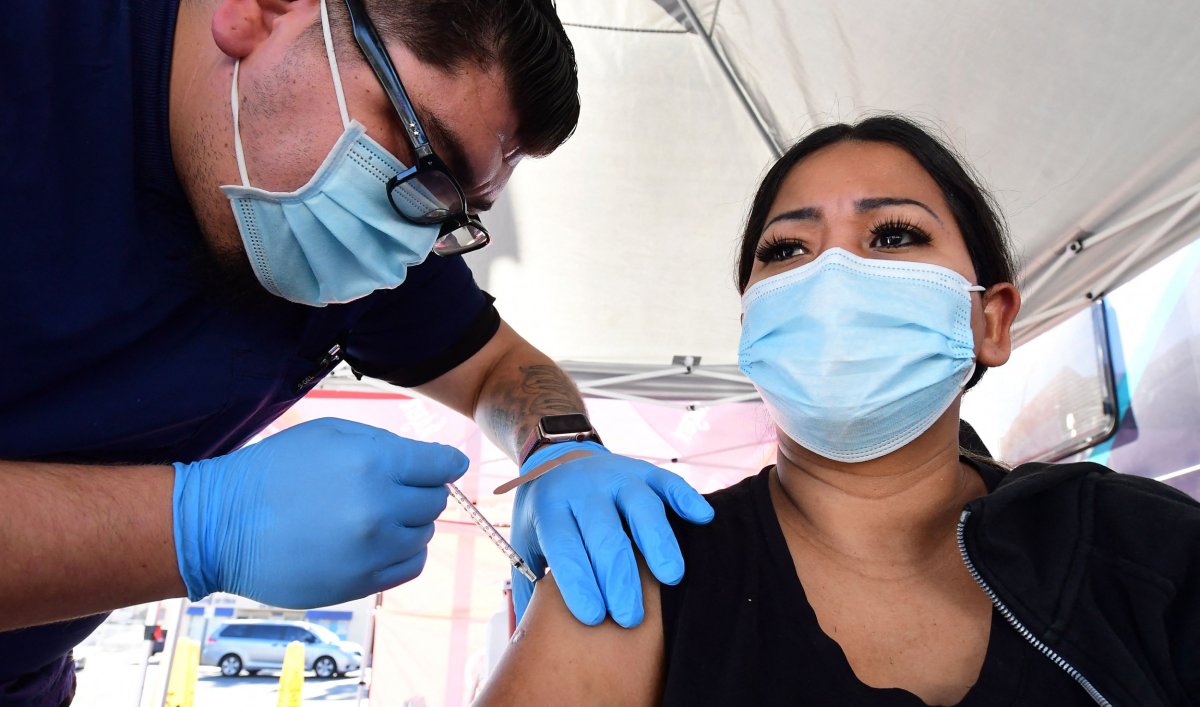A new study has shown more than two-thirds of all "adverse" side effects reported, such as headache and fatigue, following the first dose of a COVID-19 vaccine were attributed to the "nocebo effect."
The nocebo effect is the "negative counterpart" to the placebo effect, which is the phenomenon where a person's health is reported to improve after receiving a treatment with "no pharmacological therapeutic benefit," explains the Beth Israel Deaconess Medical Center (BIDMC), a patient care, teaching and research affiliate of Harvard Medical School.
According to the latest study by researchers at the BIDMC, the nocebo effect accounted for 76 percent of "all adverse events" reported among those who received the first COVID-19 vaccine dose and nearly 52 percent of such side effects reported following the second dose.
The study, which was published on January 18 in the JAMA (Journal of the American Medical Association) Open Network, analyzed data from 12 clinical trials of COVID-19 vaccines, which collected reports on adverse side effects from 22,578 placebo recipients and 22,802 vaccine recipients.
The latest research showed that more than 35 percent of placebo recipients reported "systemic adverse events," which are symptoms affecting the entire body, such as fever, following the first injection.
Headache and fatigue were the most common systemic adverse events reported by the placebo recipients after the first injection, at 19.6 percent and 16.7 percent, respectively, according to the study.
The systemic events reported among the placebo group declined to 32 percent following the second injection, the BIDMC report said.
What Is the Nocebo Effect?
The BIDMC explains the nocebo effect occurs when a person experiences "unpleasant side effects after taking a treatment with no pharmacological effects."
According to a March 2016 study published in the Pharmacology, Research & Perspectives journal, the nocebo effect refers to "the induction or the worsening of symptoms induced by sham or active therapies" and its underlying mechanisms are both psychological and neurobiological.
While a placebo effect can have a positive impact on the outcome of a given treatment, nocebo effects can impact the outcome in a negative way.
The 2016 study said: "The verbal and nonverbal communications of physicians contain numerous unintentional negative suggestions that may trigger a nocebo response. This raises the important issue of how physicians can at the same time obtain informed consent and minimize nocebo‐related risks."
An October 2020 study published in the Frontiers in Psychology peer-reviewed journal said: "The COVID-19 pandemic includes a perfect storm in which powerful nocebo effects may be flourishing."
These nocebo effects can be mediated by "situational-contextual factors," such as verbal information and suggestions, health care beliefs and interactions with health professionals, exposure to negative media campaigns and prior personal experience, as well as individual factors, the study explained.
In the absence of studies and data-driven evidence linking the nocebo effect to COVID-19, the outbreak of the pandemic itself may be "a perfect scenario for an amplified nocebo effect to occur," the study said.
"In particular, when individuals feel the lack of control of a new situation and the perceived high level of contagion risk, the lack of information to refer to, the lack of available treatments or vaccines, and the spread of negative news," the study said.
Why Is the Latest Nocebo Effect Study Important?
The lead author of the January 2022 study, Julia W. Haas, who is an investigator in the Program in Placebo Studies at BIDMC, said: "Collecting systematic evidence regarding these nocebo responses in vaccine trials is important for COVID-19 vaccination worldwide, especially because concern about side effects is reported to be a reason for vaccine hesitancy."
A senior author of the study, Ted J. Kaptchuk, who is the director of the Program in Placebo Studies and the Therapeutic Encounter at BIDMC and a professor of medicine at Harvard Medical School, explained that "nonspecific symptoms" like headache and fatigue are among the most common adverse side effects following COVID-19 vaccination that are listed in many information leaflets.
"Evidence suggests that this sort of information may cause people to misattribute common daily background sensations as arising from the vaccine or cause anxiety and worry that make people hyper alert to bodily feelings about adverse events," Kaptchuk said.
"Medicine is based on trust," he said. "Our findings lead us to suggest that informing the public about the potential for nocebo responses could help reduce worries about COVID-19 vaccination, which might decrease vaccination hesitancy."

Uncommon Knowledge
Newsweek is committed to challenging conventional wisdom and finding connections in the search for common ground.
Newsweek is committed to challenging conventional wisdom and finding connections in the search for common ground.
About the writer
Soo Kim is a Newsweek reporter based in London, U.K. She covers various lifestyle stories, specializing in travel and health.
Soo ... Read more
To read how Newsweek uses AI as a newsroom tool, Click here.








